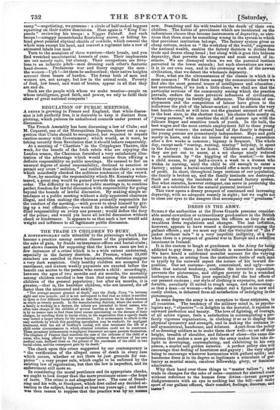DRESS IN THE ARMY.
SURELY the authorities at the Horse Guards presume consider- able moral cowardice or extraordinary good-nature in the British Army, or they would not persecute the officers as they do with vexatious dress regulations and changes. The last infliction, however, appears to have roused a dangerous spirit among the gallant of and we must say that the visitation of .",the P jacket without tails " is a very impolitic indignity, 'at a time when there is a prospect of general war in Europe and a rebellion imminent in Ireland.
It is the custom to laugh at gentlemen in the Arm- y for being addicted to gay dress ; but the ridicule is somewhat misapplied. We have heard a celebrated moralist account for the varying tastes in dress, as arising from the instinctive desire of each man to typify by his outward aspect the nature of his inward dis- position. Our set costume—poor constrained, and ugly—mor- tifies that natural tendency, confines the inventive capacities, prevents the picturesque, and obliges poverty to be a wretched burlesque on riches. The poor especially feel the bad effects of our present customs ; our style of clothing is expensive, not com- fortable, peculiarly ill suited to rough usage, and unbecoming,' so that a man—or woman—who cannot cut a figure in new ands costly clothes, is debarred from all satisfaction of indulging in the picturesque.
In some degree the army is an exception to those strictures, in all countries. The tendency of the military mind is, as psycho- logists say, " objective "—it delights in the material, it rejoices in outward perfection and beauty. The love of fighting, of courage, of all active vigour, feels a satisfaction in contemplating a per- fectly vigorous organization, in clothing it so as to display that physical symmetry and strength, and in making the costume it- self symmetrical, handsome, and eclatant. Apart from the policy of so dressing soldiers as to make them show well—to set off their height, breadth of shoulder, and fulness of chest—the same dis- position that makes a man go into the army makes him take de- light in developing, contemplating, and exhibiting in his own person, a scarlet and golden exterior. A perfect policy also will encourage that feeling of heartiness and gayety ; the very object being to encourage whatever harmonizes with gallant spirit; and handsome dress is in its degree as legitimate a stimulant of' gal- lantry as martial music, emulous fellowship, glory, or feminine admiration.
Why then hand over these things to "master tailors "; who trade in changes for the sake of sales—contract for abstract coats without reference to the human form divine—invent gewgaw disfigurements with an eye to nothing but the bill—and make sport of our gallant officers, their comfort, feelings, decorum, and tastes


























 Previous page
Previous page